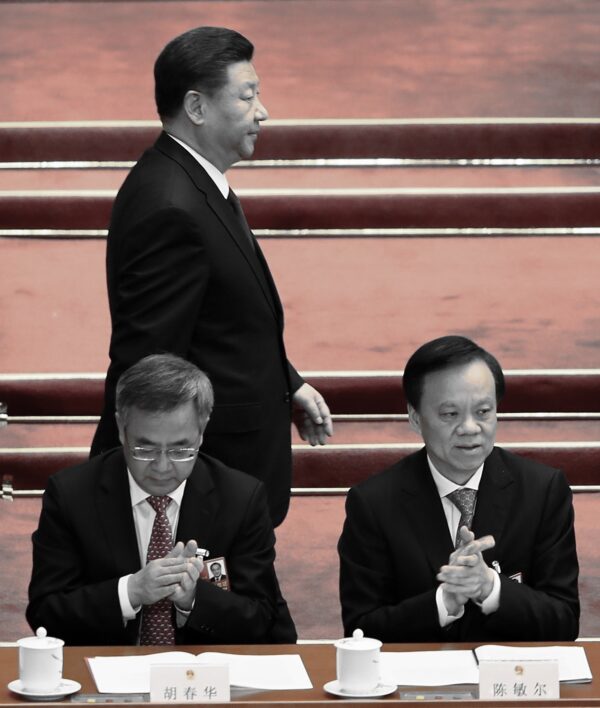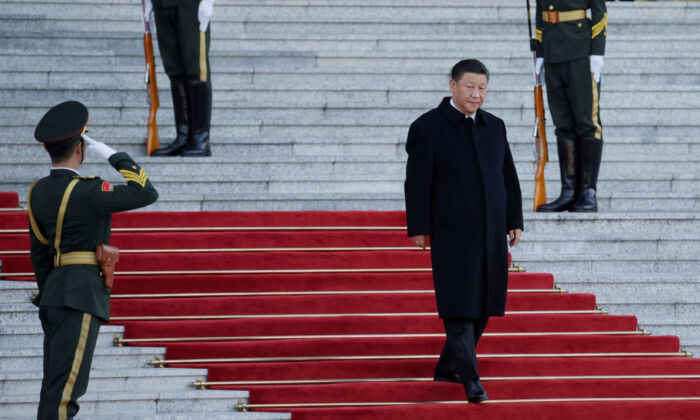McConnell Criticizes Impeachment Inquiry as ‘Kangaroo Court’ in Fundraising Pitch
The Chinese Communist Party (CCP) holds its fourth plenary session from Oct. 28 to 31. Following tradition, Party leader Xi Jinping will make political rearrangements, including changing senior officials’ positions.
An insider told the Chinese-language Epoch Times in a recent interview that Xi will replace top Beijing officials in charge of managing Hong Kong affairs, including Wang Zhimin, current director of the Hong Kong Liaison Office, and Zhang Xiaoming, director of the Hong Kong and Macau Affairs Office within China’s State Council, a cabinet-like agency.
The plenary session is a closed-door meeting, with roughly 370 elite CCP officials attending. Beijing usually keeps details secret until after the meeting ends.
Hong Kong
Hong Kong is in the midst of unprecedented unrest, after the government led by Carrie Lam tried to launch a controversial extradition bill that would allow mainland China to transfer individuals from Hong Kong to face trial in CCP-controlled courts.
Since June, millions of Hongkongers took to the streets against the extradition bill, viewing it as an encroachment into the city’s autonomy, as guaranteed by the CCP after the territory reverted from British to Chinese rule in 1997.
In May, insiders told the Chinese-language Epoch Times and other media that the Hong Kong Liaison Office, the representative agency of Beijing located in Hong Kong, initiated the proposal to draft an extradition bill.
Though the bill was recently shelved amid public pressure, relations between the Hong Kong government, police, and citizens remain tense, as protesters continue to call for an independent investigation into police use of force during demonstrations and universal suffrage in the city’s elections. The central government have sent troops to Shenzhen, the mainland Chinese city bordering Hong Kong, in an act of intimidation.
An anonymous insider who is familiar with the thinking of senior officials at the CCP headquarters, Zhongnanhai, told the Chinese-language Epoch Times that Beijing is planning to replace Lam next year, with Wang and Zhang replaced sometime before that.
“It’s highly possible that Wang won’t come back to Hong Kong after he participates in the fourth plenary session,” the insider said. “Zhang will be replaced in the near future.”
He explained that both Wang and Zhang are members of a faction loyal to former Party leader Jiang Zemin, who are opposed to Xi’s leadership.
The insider added that Beijing was considering two candidates to replace Wang: Chen Dong, the current deputy director of the Liaison Office, originally from Fujian province; and Liang Jianyong, the provincial propaganda director of Fujian.
Xi worked in Fujian from 1985 to 2002. The insider said both Chen and Liang are in the pro-Xi camp.
But the insider did not know who would replace Zhang.
‘Ideological Innovation’
Usually, each fourth plenary session, is focused on political reform.
Reuters quoted two anonymous CCP officials and reported on Oct. 25 that Beijing’s prepared communique will focus on “ideological innovation.”
One of the insiders added that the plenum will discuss policy reforms to improve governance: “They [CCP officials] need to transform the overall state governance capacity and adapt to changes in global rules and withstand stress tests from external risks,” adding that the trade war with the United States had been a major source of pressure.
 Chinese leader Xi Jinping Walks through Vice Premier Hu Chunhua and secretary of the Chongqing Municipal Party Committee Chen Min’er during the closing session of the National People’s Congress (NPC) at the Great Hall of the People in Beijing, China on March 20, 2018. (Lintao Zhang/Getty Images)
Chinese leader Xi Jinping Walks through Vice Premier Hu Chunhua and secretary of the Chongqing Municipal Party Committee Chen Min’er during the closing session of the National People’s Congress (NPC) at the Great Hall of the People in Beijing, China on March 20, 2018. (Lintao Zhang/Getty Images)Rumors
On Oct. 21 and 22, the CCP announced that 27 officials were recently sacked and placed under investigation for their corruption and other wrongdoings. They include Li Biao, deputy mayor of Zhaotong City in Yunnan Province; Li Yong, vice president of the Shandong provincial high court; and Wu Junding, Party secretary of Tianjin City’s statistics bureau.
Recently, several Taiwanese and Hong Kong media, citing insiders, also reported that Hu Chunhua and Chen Min’er, both members of the 25-member elite Politburo, will be promoted to the Politburo Standing Committee, the Party’s highest decision-making body.
Xi wants to change this current seven members in the Standing Committee to nine.
The Standing Committee has fluctuated in numbers throughout the Party’s history. It had less than seven members during the Party’s early years. The number varied under Mao’s rule after the Party’s takeover, then settled into seven members in the 1980s and 1990s. It was increased to nine members in 2002, then changed back to seven members in 2012 when Xi came to power.
Several Hong Kong media reported that the No. 6 member of the Standing Committee Zhao Leji may be punished because he was allegedly involved in a corruption scheme involving building luxury villas in the famed Qinling Mountains nature reserve, as well as a botched coal mine court case when he was Party boss of Shaanxi Province from 2007 to 2012. The corruption scandals were revealed in 2018 and 2019.
Commentators had different opinions on the results of the plenum.
U.S.-based China affairs commentator Shi Shi told the Chinese-language Epoch Times on Oct. 25 that it’s hard to say whether the Party would reorganize personnel since Xi just amended China’s Constitution in March 2018, which lifted the ban on Chinese leaders’ term of office.
U.S.-based commentator Wang He published a commentary on Chinese-language Epoch Times on Oct. 25 and analyzed: “It’s not important whether these rumors are real or not; the key point is the direct impact of these rumors [on the Party].”
Wang believed that these rumors were leaked to the media by different Party factions intentionally, in an attempt to influence the results of the plenum.
This article is from the Internet:Insiders Reveal Upcoming Personnel Changes at Chinese Communist Party Conclave
House Intelligence Chair Adam Schiff Says He Wasn’t Told About al-Baghdadi Raid
